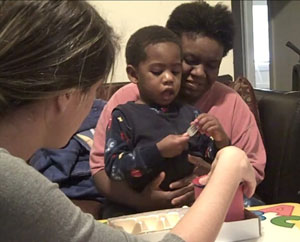Supporting Rural Families with Toddlers on the Autism Spectrum
December 10, 2013

|
The Family Implemented TEACCH for Toddlers study (FITT, renamed from Home TEACCHing Program to emphasize the project's relationship with families) recently finished its second of three funded years. Based on structured teaching and naturalistic strategies, this family-implemented approach provides coaching and support for families to increase interaction and engagement with their young children with ASD across daily routines. Interventionists provide 24 weekly sessions held across a 6-month intervention time period, which include four clinic-based parent group sessions (3 families per group) plus 20 in-home intervention sessions. FITT introduces families to the concepts of structured teaching, and provides families a set of strategies for working, playing, and communicating with their toddler.
FITT has an emphasis on serving rural families, with 18 of our 39 families (46%) who have completed the intervention or are currently enrolled, living in rural communities. The study process and intervention have been designed to allow access and participation to families who are often underserved. Partnerships have been formed with rural regional intervention centers, with information and resources provided related to early identification, assessment, and the benefits of early intervention for children with ASD and their families. Diagnostic assessments are also offered to participating families. Intervention is offered in-home to support families with limited transportation, and intervention is provided during non-traditional hours (e.g. evenings, early mornings, weekends) to align with varied work schedules. All families, those assigned to the intervention group (FITT) and the services-as-usual group (SAU) are provided with information about local resources to ensure access to ongoing support.
Early data related to intervention acceptability and feasibility (e.g. Did rural families like the intervention? Could the intervention be implemented well by project interventionists with rural families? Were rural families able to implement the FITT strategies?) are positive and promising. All rural families enrolled in the intervention have successfully completed; parents have been highly satisfied with FITT goals, procedures, and perceived child outcomes; and both interventionists and families are able to implement the strategies with fidelity.
Next Steps for Project
Intervention in rural and non-rural communities is ongoing, and will be completed in August 2014. Analyses of the impact of the FITT intervention on family outcomes and child outcomes will be conducted, as well as an analysis of the feasibility and acceptability of the intervention in both rural and non-rural communities. If effective, the FITT intervention will be shared with our rural partners for broader dissemination.
Project Team
FITT is an inter-disciplinary project, led by Co-PIs Dr. Lauren Turner-Brown ([email protected]), clinical psychologist, and Dr. Kara Hume ([email protected]), special educator, housed at the Carolina Institute for Developmental Disabilities at University of North Carolina at Chapel Hill (http://www.cidd.unc.edu). Project staff includes social workers, allied health professionals, and a number of student and community volunteers. For more information about the project, please contact Project Coordinator Cassidy Arnold, at [email protected].
Program Reference
HRSA MCHB grant R40 MC 22648-01, Efficacy of the Home TEACCHing Program for Toddlers with Autism







